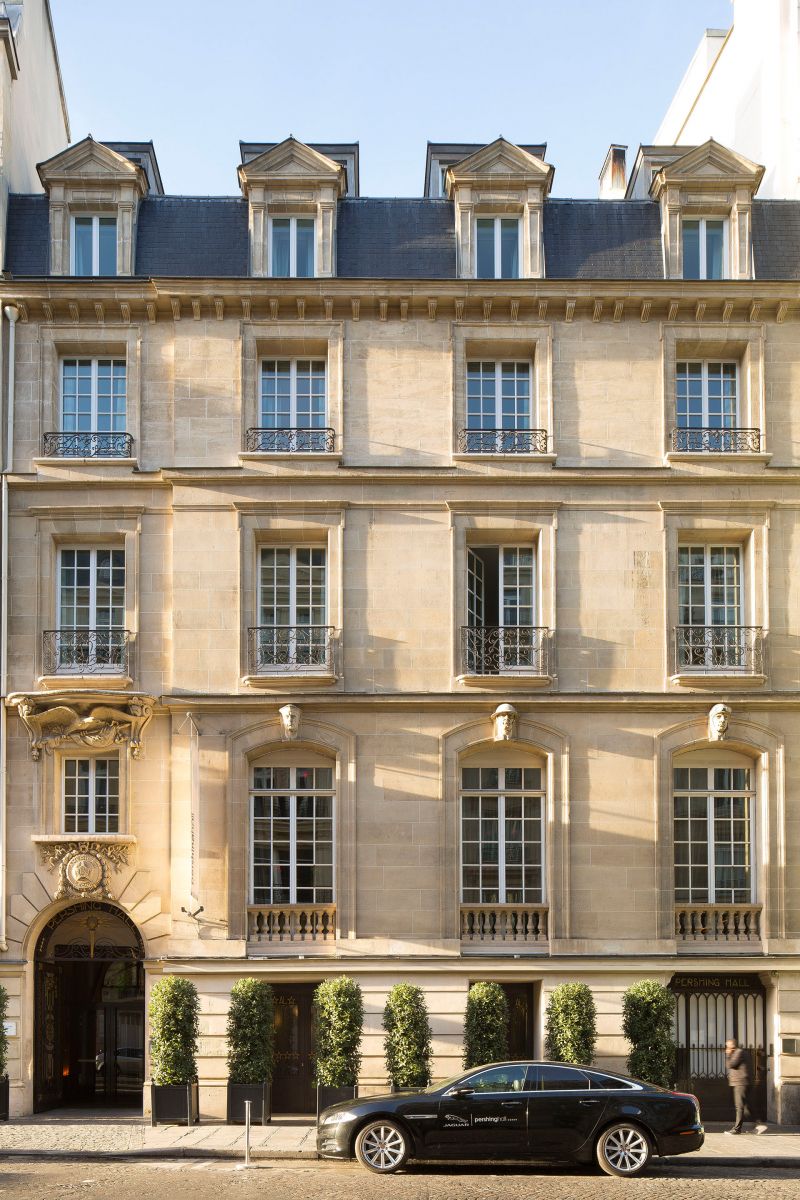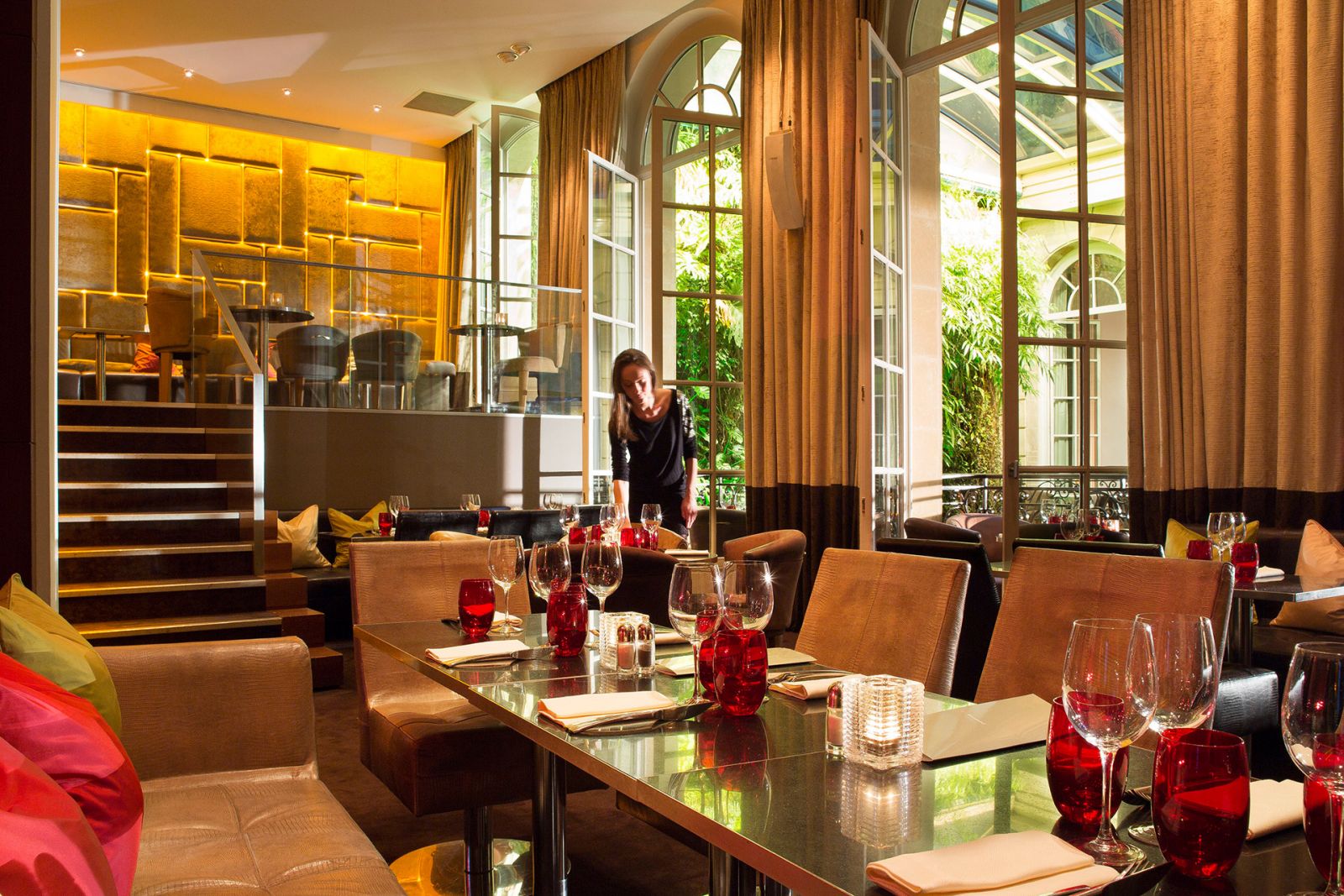In 1936 the federal government acquired a memorial for General John Pershing at 49 rue Pierre Charron in Paris from the American Legion.
The American Legion continued to manage the federal property but walked away in 1982.
Over time the property, which had fallen into disrepair, had been used for a variety of nefarious purposes.
While Uncle Sam was looking the other way, one of the federal government’s most valuable pieces of property in Europe apparently has served as a brothel, a gambling house, a black-market money center and a bar with a reputation for drunken brawls.

Credit: Pershing Hall
In the early 1990s legislation assigned jurisdiction and control of the property to the Department of Veterans Affairs.
Then in 1998 the federal government signed a 99 year lease for the redevelopment and running of the property, turning it into a boutique hotel: Pershing Hall.
The address is full of promise in itself: among the Champs-Élysées, Avenue Montaigne and Avenue George V. Right in the heart of the most prestigious area in Paris, among high-end boutiques and fashionable clubs, the Pershing Hall’s entrance, as elegant as it is discreet, opens up a unique world beyond your imagination.

Credit: Pershing Hall
The hotel is around the corner from the Four Seasons George V off the Champs-Élysées.
The federal government currently receives 1.1 million euros a year in lease payments on the property (based on the original lease requiring 1.2 million francs). Interesting there doesn’t appear to be an escalation clause — payments are fixed in the same amount annually through 2097.
Pending legislation, H.R. 2773, would authorize the Secretary of Veterans Affairs to sell the property.

Credit: Pershing Hall
The federal government owns nearly a quarter of all land in the U.S., and nearly 85% of Nevada. Obviously it owns far less abroad, however it’s one of the largest landowners in the world. While disposition of property hasn’t always been a core federal competency, its assets make it far from insolvent despite mounting debt. Some assets ought to be considered for disposal. Like a boutique hotel in Paris.
(HT: Alan H.)


My husband Frank and I spent our honeymoon at that hotel. And oh. My. god. What a TIGER he was in that room 869.
It hasn’t been called the “Veterans Administration” since 1989.
Sounds like a money maker for now so why sell. It’s not like the property is going to go down in value in the near future.
Could be a nice Trump hotel
Stvr, or a place for Bill Clinton given its past!!
I’m sure we’ll sell it at a steep discount to a Trump or Putin-affiliated oligarch.
Wait, is this part of the DOD lodging? If it is, don’t sell it then, continue to offer it for use of our Active Duty and Retired military personnel!
It’s leased out for the next 80 years at a fixed price annual lease amount with no escalation. Won’t start to be really valuable, probably, for another 70 years when the lease is nearing expiration (unless it can be terminated), and anything could happen between now and then. Not really a valuable asset yet due to low return and risk.
Narrow insights like this is why the Federal budget is managed so poorly. Now who is going to cover the shortfall once the $1.2 million revenue stops coming in?
Why get rid of something that generates decent revenue to help support veteran affairs programs?
Mind-blowing.
Before anyone grills me – yes I know 1.2 million is a drop in the bucket in the federal budget, but it is still $1.2 million and it does make a difference at the local level (I.e. Maybe helps cover X veterans obtain X services).
It is a combination of many small shortsighted decisions like this one that adds up to a big hole in the federal budget requiring that they either increase tax revenues or issue treasury securities to raise funds.
In the early ’70s, the Council on International Educational Exchange (CIEE) had its European office on one of the upper floors of Pershing Hall: the third (US numbering), I believe. The Paris office coordinated residencies by American students at universities in Rennes and in Leningrad, among other programs and cities. The building was already run-down, without air conditioning, with worn wooden floors, and with an elevator that had a gate on the car instead of a set of doors.
Members of the American Legion and their guests kept to the ground, or first, floor, where there were a library, a room with a pool table, etc. The Legion’s quarters were as run-down as those of the CIEE. Since we usually left around 5 p.m., if there were drunken brawls in the Legionnaires’ rooms, we weren’t around to witness them.
I remember Pershing Hall and several conversations with Legionnaires well, for I worked for the CIEE between1972 and 1974 and visited the Paris office during the intervals between student programs of which I was the resident director.
The building is certainly in better condition than it was when I was often there. The neighborhood still has good restaurants and shops. Perhaps the next time I’m in Paris I can renew memories and stay in the hotel that Pershing Hall has become.